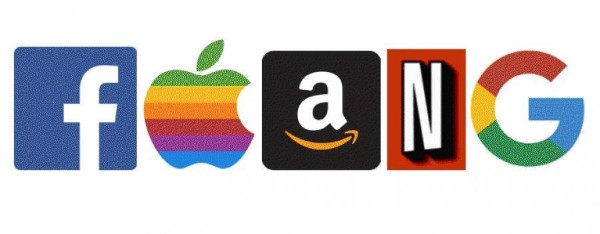On Nov. 29, during Free Hour in the President’s Lounge, the Economics and Business Club presented a panel titled “The Demise of Brick and Mortar Stores and the Rise of FAANG: Facebook, Amazon, Apple, Netflix, and Google.” Three QC professors gave presentations on the past, present, and future of FAANG while explaining key concepts and clarifying misconceptions, followed by a Q and A session with the audience.
First to present was Charles Gomez, professor of sociology. Gomez, who spent eight years in Silicon Valley and a summer as an employee of Facebook, explained the cultural context of FAANG. He said that the perception of Silicon Valley as being in a “bubble” has some truth to it. While working at Facebook, he often saw posters with slogans such as “Is this a technology company?” and “People over pixels.” Gomez explained that the engineering culture meant that it was important to remind employees that they were dealing with people, something that can often go overlooked.
Another popular Silicon Valley maxim is “Move fast and break things.” Gomez explained how this reflected a wider cultural sentiment. “One of the most famous phrases that you hear Silicon Valley people say all the time is ‘disrupt,’” he said, explaining that people in Silicon Valley see everything as an engineering problem that can be “solved, hacked, fixed, optimized.”
Gomez talked about the extremes this attitude can lead to by referencing the Juicero Press, a $700 wifi-connected juicer that squeezed special produce packs to produce juice. It was eventually discovered that these packs could easily be squeezed by hand, rendering the expensive device unnecessary.
Gomez said that ultimately “FAANG wants to be everything to everyone.” He mentioned Google, which began as a search engine but has moved into everything from healthcare to self-driving cars. Gomez said that understanding these attitudes is important for understanding FAANG.
The next speaker was David Gabel, professor of economics. Gabel challenged much of the conventional wisdom surrounding the demise of brick and mortar stores. Gabel noted that much of the conversation during the 2016 presidential election focused on the loss of coal mining and steel working jobs. However, between Oct. 2016 and April 2017, department stores had shed nearly 100,000 jobs, more than the total number of coal miners and steel workers currently employed in the United States. Department stores have lost 18 times more workers than coal mining since 2001.
Many blame these job losses solely on FAANG, but Gabel explained that there were more factors, involving both the supply and the demand side. On the supply side, Gabel said that “the number of malls in the United States grew more than twice as fast as the population between 1970 and 2015.” The U.S. has far more shopping space per capita than other countries, so the decline of these stores is due to an oversupply, not just Amazon. Additionally, on the demand side, consumers have begun to spend less on clothing, instead spending more on dining out and travel. Gabel proposed the theory that this shift is related to the rise of social media, as consumers are more interested in experiences they can post about online than in clothing.
The final speaker was Joan Nix, professor of economics. Nix began by asking the crowd whether they would prefer to invest in FAANG or brick and mortar stores. The majority of participants indicated they would prefer to invest in FAANG. Then Nix asked whether people thought their grandchildren would use Facebook. Few people raised their hands.
Nix then talked about Amazon, citing their large increase in revenue but relatively flat income due to the company’s large purchases such as Whole Foods. Furthermore, Amazon’s losses from the free shipping they offer rose from 5 million to 7 million in 2016. Meanwhile, some brick and mortar stores are in an advantageous position. Nix stated that 80 percent of the population lives within 10 miles of a Target. In this way, Nix challenged preconceptions that there is something inherently different about FAANG and showed that it is possible that the companies are not here to stay.
After the speeches, student moderator Judd Eisenberg lead a Q and A session.
Shalva Goldschein, a senior majoring in political science and president of the Economics and Business Club, was responsible for helping organize the event but gave the professors much of the credit. “The professors that spoke were instrumental in planning the event.”
Ben Alter, a junior majoring in accounting and finance and a member of the Economics and Business Club, said Professor Gomez’s experiences in Silicon Valley is part of the reason they organized the event. “We wanted everyone to get the insights he would give, as well as Professor Nix and Gabel.”














